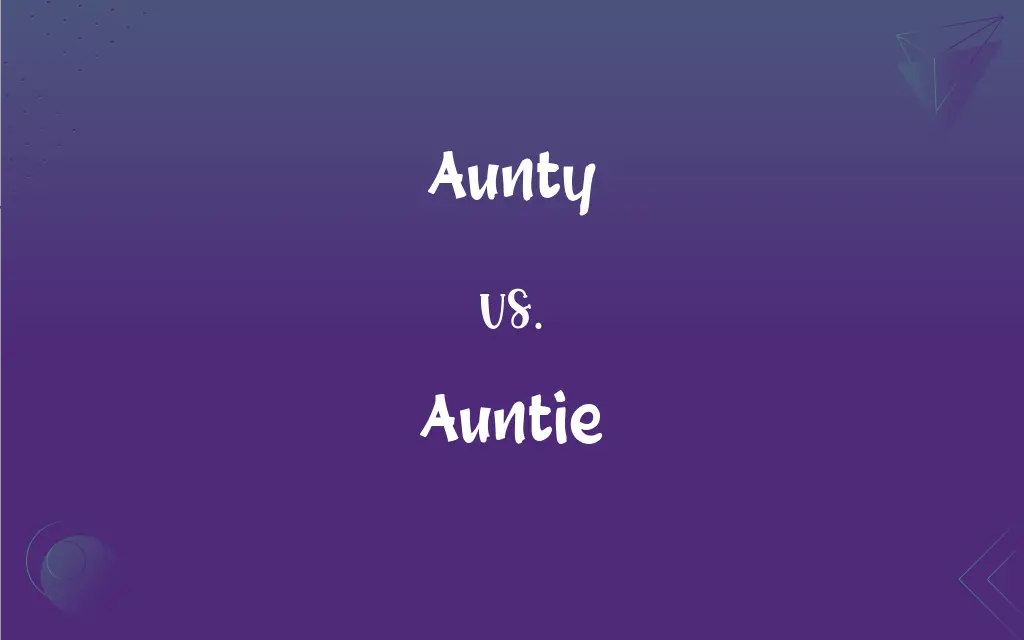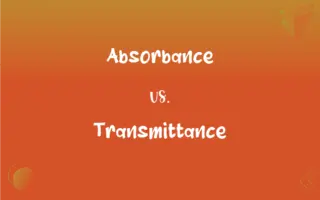Aunty vs. Auntie: What's the Difference?
By Harlon Moss & Janet White || Updated on September 30, 2023
Aunty and auntie both refer to the sister of one's parent, but "aunty" is often used in British English, while "auntie" can be more common in American English.

Key Differences
"Aunty" and "auntie" both denote a familial relationship, acting as an alternative to the more formal term "aunt." Despite their shared meanings, they are utilized distinctively across different English-speaking regions. "Aunty" commonly punctuates British English, whereas "auntie" is frequently employed in American vernacular.
Variations like "aunty" and "auntie" exude a warm, informal connotation, often embracing not only biological relationships but also close family friends. They intertwine with regional dialects and colloquial expressions, where "aunty" might be heard more in British and Commonwealth nations and "auntie" prevailing in the United States.
Contextually, "aunty" and "auntie" can interchange without jeopardizing comprehension. The divergence in usage primarily nestles in regional linguistic preferences, where the British might lean towards "aunty," and Americans might exhibit a propensity for "auntie."
Culturally, both "aunty" and "auntie" seep into societal interactions, where they may also be utilized to address older women in a community respectfully, even outside familial connections. Though regional proclivities towards "aunty" or "auntie" exist, both are universally understood across English-speaking locales.
In literary and conversational contexts, writers and speakers may choose "aunty" or "auntie" based on rhythm and flow, as both words, while similar, lend themselves to different phonetic applications. "Aunty," with its crisp ‘t’, and "auntie," with its soft ‘tie,’ provide varied auditory experiences.
ADVERTISEMENT
Comparison Chart
Regional Usage
Predominantly British English
Commonly used in American English
Spelling
A-U-N-T-Y
A-U-N-T-I-E
Phonetics
Shorter, sharper ‘t’ sound
Softer, extended ‘tie’ sound
Cultural Context
Used widely in Commonwealth
Prevalent in US vernacular
Connotations
Casual, familial, respectful
Informal, endearing, familial
ADVERTISEMENT
Aunty and Auntie Definitions
Aunty
Familial Relation.
Aunty Martha always bakes us cookies.
Auntie
Affectionate Title.
Auntie Lou is actually my mother’s best friend.
Aunty
Sign of Respect.
Aunty Singh helped me find my lost kite.
Auntie
Societal Usage.
Auntie often shares tales of the old days with us.
Aunty
Cultural Reference.
Aunty watches over the neighborhood children.
Auntie
Biological Relationship.
Auntie Jane is my mother’s youngest sister.
Aunty
Friendly Address.
The kids adore Aunty Karen from next door.
Auntie
Community Respect.
We bought flowers for Auntie Miller’s birthday.
Aunty
Casual Term.
Aunty Jo’s stories are the most exciting.
Auntie
Diminutive of aunt
Aunty
Alternative spelling of auntie.
Auntie
Term of familiarity or respect for a middle-aged or elderly woman.
Auntie
To be or behave like the aunt of.
Auntie
A familiar name for an aunt. In the southern United States a familiar term applied to aged negro women.
Auntie
The sister of your father or mother; the wife of your uncle
Auntie
Informal Reference.
Auntie Lee made her signature pie for the event.
FAQs
Is "auntie" predominantly American?
Yes, “auntie” is widely used in American English.
Can “aunty” and “auntie” be used interchangeably?
Generally, yes, but regional preferences might apply.
Can “aunty” and “auntie” refer to non-relatives?
Yes, both can be used for family friends or to address elder women respectfully.
Can "aunty" and "auntie" be utilized outside of familial contexts?
Yes, they can address older women in a community respectfully.
Which one is more formal: aunty or auntie?
Both are informal and can be used interchangeably in casual settings.
Is “aunty” more British English?
Yes, “aunty” is more commonly used in British English.
How do pronunciation differences impact usage?
It mostly pertains to regional dialects and personal or cultural preference.
Is there a spelling difference?
Yes, "aunty" is spelled with a “y,” and "auntie" with “ie.”
Are there diminutives for “aunty” and “auntie”?
They are already diminutives of “aunt.”
Are “aunty” and “auntie” used in writing?
Yes, both can be used in writing, especially in informal contexts.
Which term is older: “aunty” or “auntie”?
Both have old origins, but the exact historical first usage isn't clear.
Can “aunty” and “auntie” be used globally?
Yes, understanding may vary, but they are recognized in English-speaking regions.
Can men be addressed as “aunty” or “auntie”?
Typically no, these terms are gender-specific to women.
Do these words appear in official documents?
Rarely, as they are informal; “aunt” might be used in more formal or official documents.
Is “aunty” used in American literature?
It can be, but “auntie” is usually more common.
About Author
Written by
Harlon MossHarlon is a seasoned quality moderator and accomplished content writer for Difference Wiki. An alumnus of the prestigious University of California, he earned his degree in Computer Science. Leveraging his academic background, Harlon brings a meticulous and informed perspective to his work, ensuring content accuracy and excellence.
Co-written by
Janet WhiteJanet White has been an esteemed writer and blogger for Difference Wiki. Holding a Master's degree in Science and Medical Journalism from the prestigious Boston University, she has consistently demonstrated her expertise and passion for her field. When she's not immersed in her work, Janet relishes her time exercising, delving into a good book, and cherishing moments with friends and family.






































































